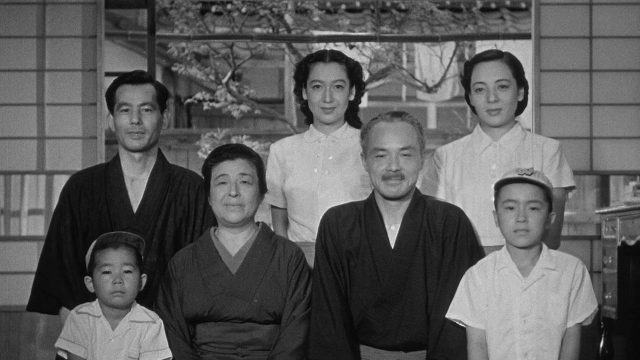The plot of Early Summer can be boiled down to about a paragraph. The Mamiya family all live together in a house in Tokyo, including their single adult daughter Noriko (Setsuko Hara). A visiting uncle’s questions exacerbate the pressure on Noriko to settle down and get married. When a widowed family friend is assigned to work in the countryside, his mother asks Noriko to marry him and she quickly accepts. Noriko’s family is horrified, as Yabe is older and has a daughter from his previous marriage, but Noriko seems fairly certain of her decision. She feels guilt about causing the family to split apart, as her parents will now move as well, but they assure her that this was inevitable.
Early Summer is the first Ozu film I’ve seen and it confirms some of the common stereotype of his work in that the movie is slow and is truly disinterested in traditional plot momentum. Everything that truly happens in Early Summer is in the last forty minutes. But what’s really important here are the small, impactful moments and locations the camera lingers on, holding onto subjects and places as if extricating every last drop of awe and greater purpose from them: the exterior of the beach as Noriko and Fumiko disappear to the shore, Koichi scolding his children too harshly. The languid pace means that as in life, when things get serious and people reveal something unexpected about themselves, viewers are caught off guard. There is no inherent expectation that a character arc will pay off or there will be some kind of catharsis. When characters do show deeper emotions and confront the sweep of their lives, they are simply alive and not playing a part in a formula, and the effect is deeply moving.
What makes Early Summer far smarter than the elegiac indies it would inspire decades later is how this melancholy is shot through with a healthy moral ambiguity. Like Elizabeth Bennett, Noriko doesn’t have a lot of choices in a society where unmarried women are outright embarrassing to their relatives (even if unlike Elizabeth she has a job and contributes to the family). She can smile and giggle while dodging passive-aggressive questions* from everybody but her older brother is getting impatient and she’s at an age when people think “You can’t be too picky” is a polite thing to say out loud. Her choices near the end could be seen as either Noriko capitulating to her family, or making the most independent decision she could under the circumstances. It doesn’t even feel like a romantic choice (she accepts Yabe’s mother’s proposal) but the one that would afford her the most happiness. The last shots beg the question of whether viewers should feel comfort that the bride still does the traditional procession or unease with the familial institution at the center of all things.
The final thirty minutes made me remember the mix of emotions I’ve always felt readying to leave the towns and cities I’ve stayed in. Time seemed to break down and old locations, certain streets brimmed with wistful energy. I’d lose myself in certain memories and try to think back on what I’d absorbed from my time there.
Somehow Ozu has captured the melancholy of “mono no aware”, a Japanese term for the wistful awareness that everything is transient and one must accept sudden shifts and endings as a melancholy part of life. The Mamiya parents more than anyone understand mono no aware. Like other old people, they have accepted the world for what it is and are now contemplating the years behind and before them. Everything continues on after the family splits up – Noriko now lives with her husband, brides walk in traditional dress, and barley moves along with the breeze. Things change and they also stay the same.
*Early Summer politely implies that in collectivist Japan, the kinds of angry confrontations you’d see in an American movie about family are pretty rare, but this also means passive-aggressive behavior is fairly normalized. The most cutting lines in the movie are delivered with a smile and a joke, and Koichi’s temper is an uncomfortable anomaly.

